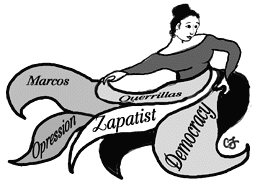|
Zapatista
movement sparks feelings By Anita
Boeninger I’ll tell you about something beautiful. Just two weeks ago, a flood of people from all over the world, people from various backgrounds and colors, streamed through a land of lush mountains and glittering cities, collecting energy and momentum as they arrived in the capital. In our multi-ethnic,
colorful neighbor to the immediate south, the world has been watching
as an indigenous people’s movement, centuries in the making,
had one of its most dramatic public manifestations. I am speaking
of the Zapatista movement in Mexico. These people have often been and are still referred to as “rebels” or “guerrillas.” However, over time, as they gained global connections coupled with the transition in power to the currently favored president, their image shifted from one of masked enemy to public advocate of the poor and oppressed of Mexico. The opportunity for a grand march to the capital ripened with this culmination of public support. One of the main organizers in this effort, Subcommandante Marcos, has become something of a cultural icon, even a commercial commodity, at the worst. The same man who protests the imposition of capitalism and neoliberal schemes that disintegrate the indigenous way of life can be found on the front of T-shirts and other products. The irony is almost tragic. But that cannot diminish his poetic spirit and cannot quench the dignity of such an enduring people. It is difficult not to become captivated by this man when he speaks: “We have begun our journey to the capital of our country, Mexico,” he said. “Ours is the march of indigenous dignity, the march of those of us who are the colors of earth, and the march of those who are all the colors of the heart of the earth.” It’s hard to say which aspect of his speech held the most power. What astounds me even as I read over the words is that they are only half of the beauty. As his voice flowed into the plaza crammed with more than a reported 500,000 people, the words became vehicles of incredible persuasion. Tender and replete with conviction, they were bound inextricably to the fervid spirit of an entire people. It is no mystery that the coverage mainstream press delivers us is scant, even blatantly immune to some of the most profound international events. Furthermore, it is not surprising that even the U.S. civil rights movement received minimal or skewed press as it unfurled. Now, as we examine the brave actions of individuals and communities during the civil rights movement, a sense of awe and historic pride washes over us. And now, in another splendid and distinguished country, a parallel movement is unfolding in the most inspiring of ways. Sadly, we do not hear of these kinds of things very often. And if we do, it is simplified, pared down, denuded. Subcommandante Marcos addressed this very possibility in his speech. “Today they want to make us a fashion,” he said. “Today they want to make us a spectacle. Passing news. Today they want to make us momentary. Instantaneous. Fleeting. Disposable. Dispensable. Forgettable.” It is easy to do. So much information spills through our fingers. Information has perhaps become the world’s greatest, most mechanized commodity. But it does not have to be this way. The events in Mexico have only strengthened my conviction that many of us in our comfortable lives have fallen asleep. We are asleep. This becomes starkly apparent when exposed to the sweeping fervor of the Zapatistas, who understand democracy because they fight for it, who understand oppression because they suffered under it, who understand dignity because they champion a noble cause, who understand, at a much deeper level, what it means to be alive because so many among them have died. Let’s not allow such a revolution, such a magnificent display of the demand for justice, to simply fade into the background. Many argue the news is too disturbing to watch. “We have enough on our plates already to think about all the suffering in the world,” they might say. Yet I would argue that being fully alive entails entering into both the joys and suffering of those around us, just as Marcos concluded his speech by saying, “We were reunited by sorrow and hope. Sorrow and hope will make us walk once again, as we did yesterday. As we always have.” Anita
Boeninger is a senior social work major from Fort Worth.
Editorial policy: The content of the Opinion page does not necessarily represent the views of Texas Christian University. Unsigned editorials represent the view of the TCU Daily Skiff editorial board. Signed letters, columns and cartoons represent the opinion of the writers and do not necessarily reflect the opinion of the editorial board. Letters to the editor: The Skiff welcomes letters to the editor for publication. Letters must be typed, double-spaced, signed and limited to 250 words. To submit a letter, bring it to the Skiff, Moudy 291S; mail it to TCU Box 298050; e-mail it to skiffletters@tcu.edu or fax it to 257-7133. Letters must include the author’s classification, major and phone number. The Skiff reserves the right to edit or reject letters for style, taste and size restrictions. |
The TCU Daily Skiff
© 1998, 1999, 2000, 2001
Web Editor: Ben Smithson
Contact Us!

